Youtube (featured videos)
Good news
- Raniero Cantalamessa
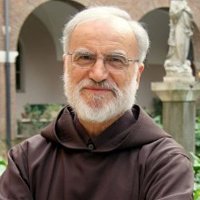 he Baptism in the Spirit's effectiveness in reactivating baptism consists in this: finally man contributes his part -- namely, he makes a choice of faith, prepared in repentance, that allows the that allows the work of God to set itself free and to emanate all its strength. It is as if the plug is pulled and the light is switched on. The gift of God is finally "untied" and the Spirit is allowed to flow like a ftragrance in the Christian life.
he Baptism in the Spirit's effectiveness in reactivating baptism consists in this: finally man contributes his part -- namely, he makes a choice of faith, prepared in repentance, that allows the that allows the work of God to set itself free and to emanate all its strength. It is as if the plug is pulled and the light is switched on. The gift of God is finally "untied" and the Spirit is allowed to flow like a ftragrance in the Christian life. - Peter Hocken
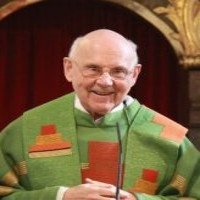 During the night between Friday and Saturday, in the early morning hours of 10 June 2017, the Lord called back to Him a great man, Father Peter Hocken.
He died at the age of almost 85. He was a servant of God, a friend, a priest who loyally served the Body of Christ until his last breath, all the world round. The Lord gave him an extraordinary intellect and wisdom, together with the experience of baptism in the Holy Spirit. He also received from God the talent and ability to provide specific and comprehensible theological explanations and descriptions of spiritual experiences that are taking place within the Church, notably after the Second Vatican Council.
During the night between Friday and Saturday, in the early morning hours of 10 June 2017, the Lord called back to Him a great man, Father Peter Hocken.
He died at the age of almost 85. He was a servant of God, a friend, a priest who loyally served the Body of Christ until his last breath, all the world round. The Lord gave him an extraordinary intellect and wisdom, together with the experience of baptism in the Holy Spirit. He also received from God the talent and ability to provide specific and comprehensible theological explanations and descriptions of spiritual experiences that are taking place within the Church, notably after the Second Vatican Council. - Dr. Martin Luther King Jr.
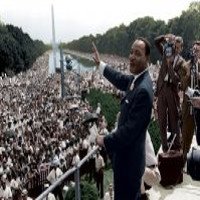 "I have a dream," he began, "that one day on the red hills of Georgia, sons of former slaves and sons of former slave-owners will be able to sit down together at the table of brotherhood. "I have a dream my four little children will one day live in a nation where they will not be judged by the color of their skin but by the content of their character."
"I have a dream," he began, "that one day on the red hills of Georgia, sons of former slaves and sons of former slave-owners will be able to sit down together at the table of brotherhood. "I have a dream my four little children will one day live in a nation where they will not be judged by the color of their skin but by the content of their character." - Peter Dufka SJ
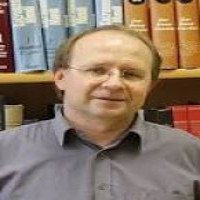 We all know, based on our personal experience, that the cooperation with most intelligent people is not often easy. These people usually do not establish friendship easily. It is interesting also that university graduates with an honour degree usually do not fit in to the working environment in the best way and that their high intellect is of a little help in overcoming personal or marriage crises.
We all know, based on our personal experience, that the cooperation with most intelligent people is not often easy. These people usually do not establish friendship easily. It is interesting also that university graduates with an honour degree usually do not fit in to the working environment in the best way and that their high intellect is of a little help in overcoming personal or marriage crises. - Marek Nikolov
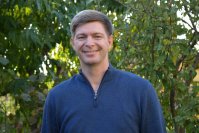 The aim of the “Jesus Heals” prayer gatherings is experiencing the fact that God is Love. He is Love that wants to give itself to other people. God wants to show us His mercy even through healing, signs, wonders, and miracles.
The aim of the “Jesus Heals” prayer gatherings is experiencing the fact that God is Love. He is Love that wants to give itself to other people. God wants to show us His mercy even through healing, signs, wonders, and miracles.
Video
Prorocká výzva Geoffa Poultera pre Slovensko, ktorá sa začína napĺňať.
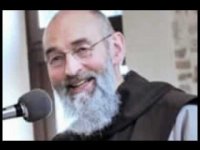 Zaujímavá a výpovedná skúsenosť západoeurópskeho muža s hinduizmom, budhizmom, jógou, ezoterikou a okultizmom.
Zaujímavá a výpovedná skúsenosť západoeurópskeho muža s hinduizmom, budhizmom, jógou, ezoterikou a okultizmom.
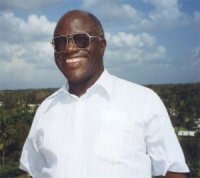 Príbeh bývalého teroristu, ktorý dnes spája etniká a kmene.
Príbeh bývalého teroristu, ktorý dnes spája etniká a kmene.
Stephen Lungu
 Hudobníčka Lacey Sturm, bývalá speváčka kapely Flyleaf, bola presvedčenou ateistkou a mala v úmysle vziať si život... ale zrazu sa všetko zmenilo.
Hudobníčka Lacey Sturm, bývalá speváčka kapely Flyleaf, bola presvedčenou ateistkou a mala v úmysle vziať si život... ale zrazu sa všetko zmenilo.
We all are part of a great story. The great story of the world is composed of past and present stories of lives of individual people. The portal mojpribeh.sk is focused on the most important moment of the story of the world and individual, the moment of personal experience of person with God.
Story - Vladimír Jukl
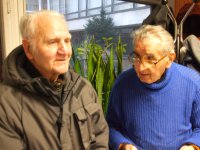
Imprisoned for spreading the Gospel. He is the first person from left in this picture.
The Nation's Memory Institute (ÚPN) has recorded his life story also through videos (click here)
I was born on 19 April 1925 in Bratislava. My father was of Czech origin. He worked thirty years as professor at the Trade Academy of Bratislava. My mother was at home. I also had a brother. He was three years younger than me. He already passed away. I spent most of my childhood and youth in Bratislava. As a secondary school student, my favourite matter was mathematics. Therefore, after having passed my maturity exam I started to study at the Faculty of Natural Sciences at the Comenius University in Bratislava, section of Mathematics and Physics.
During the first year of my university study I met an extraordinary priest of Croatian origin, Dr. Tomislav Kolaković. I was so fascinated by the wisdom and by the knowledge of this priest that I wanted to abandon my mathematics studies and go to the seminar. Professor Kolaković was very wise. He advised me to achieve one study subject (i.e. mathematics and physics); then, if my call to be a priest will be confirmed, I will have enough time to study theology. I accepted his piece of advice and I kept studying mathematics and physics. Later on I participated in the Slovak National Insurrection against the Nazi-fascist occupation. At that time I was a strenuous factotum;
officially they called me "the secretary of Professor Kolaković".
During the school year 1943/44 (it was my first year at the Faculty of Natural Sciences) the National Insurrection started in Slovakia. With regard to his intendment and to his religious activity (aiming at helping the Catholic Church in the USSR destroyed by the war) Professor Kolaković needed to get to the USSR and to talk about this issue with competent persons. So he left to the territory concerned by the insurrection; he wanted to establish contacts with Soviet politicians or officials. To a certain extent he succeeded in his goal. He intended to go to the USSR. In order to do that he couldn't loose contacts with the Russians. So he waited with a group of four French partisans and one American pilot until he could have a chance to meet some high ranking Soviet diplomat or official. He needed to keep in touch with people who had similar objectives; therefore, during the insurrection Kolaković operated amongst the Russians and provided medical help to wounded Russians soldiers. Indeed he had completed a large part of medicine studied in the past. I experienced various reverses of circumstances together with him. We spent the winter in awful and unbearable conditions because of the weather. We were in a mountainous region and we were dwelling in a bunker built on the slope of a hill called Vepor (or also Hrb) in the area of the Slovak Rudohorie. During this stay Kolaković managed to establish contacts with some leaders of the Soviet mission. At the end of the war – through several stops – he managed to reach the city of Košice. Hence a group of Soviet officials brought him to the Russian general army staff. From this position he could move on to the HQ. Unfortunately, I was not allowed to act there. Military agents considered that it was not necessary for Kolaković to have a secretary or a translator.
When the war ended we went to Prague together with a friend, Silvester Krčméry to carry the Gospel in the sense of Kolaković's orientation, an appeal for Christianization of Russia, in several environments.
Again we succeeded in making connections with Kolaković who in the meantime returned from the Soviet Union. At the beginning he settled in Eastern Slovakia; later, he went to Prague, where an international congress of Christian students PAX ROMA-NA was on. There, Kolaković had a chance to connect with several future politicians and also with the Church dignitaries of the Czechoslovak Republic. We started group meetings not only in Prague but also in the whole Bohemia in the spirit of the apostolate, in which Professor Kolaković was confirming us. Little by little these meetings were effectively helping the members of these groups interfere into the public and also professional and scientific life.
Soon it was evident that the Soviet secret services (and according to their instructions also the Czechoslovak secret services) tried to disable Kolaković, to arrest him; therefore Kolaković took refuge abroad, particularly in Belgium, where he had friends.
Kolaković was preparing us for Church persecution. We, the members of the community he created, regardless of our own risk of being arrested, continued in a small work of catholic university or other groups. It cost us years of prison.
As we forecasted, after the year 1948 it really happened that the communist regime started gradually but systematically to persecute not only the high hierarchy but also active priests and even a number of apostolically active laypeople, among whom I belonged too. I remark that also long after this I remained a layman. I wasn’t a priest, although many people thought that I was already a long time serving priest.
But let me continue with the story I began to tell. I was convicted a member of a group called “Madr and co.” Oto Madr is a known Czech theologian. He published theological texts at a very high level. I cooperated with him when I studied in Prague and then, when illegal conditions arose, we continued with our work. Madr had opportunities to send news about the religious situation in Czechoslovakia to the Vatican through the Italian Embassy in Prague. We continued with this activity. After the departure of Kolaković, father Madr was the head, until he was arrested in 1951. Then, ten months of isolation and investigation followed. Finally, a legal trial concerning the group “Madr and co.” followed. In this trial I was the second accused, as I represented Slovakia in this group. The agents of STB (State Security), which represented judicial and investigation bodies, gave me the label RIGHT HAND OF MADR IN SLOVAKIA. Therefore I received - I would say - an excessive high sentence in the proceeding. Madr was sentenced to life imprisonment. I was sentenced right after him, as a layman, to 25 years of imprisonment. I spent 13 and half years in prison. Then, the situation started to get gradually better, to ease, mainly considering the fact that the western powers requested from the Soviet Union bigger democracy and also religious freedom; so under this pressure many fellow prisoners got released. They didn’t release me because of the accusation of treason and of my 25-year jail sentence. Nevertheless, they released co-prisoners who were politically active. Moreover, I was excluded from the “favour” of an amnesty on the occasion of the election of the communist president (1960, 1962). So I lived with bitterness these last years of imprisonment. Apart from some exceptional moments, I was almost all the time with prisoners having a criminal background. I was one of the few remaining political prisoners. We, the members of the catholic action, didn’t consider us to be politically active and we emphasized that we worked in religious area and we didn’t care for politics and didn’t have contacts in this direction; nevertheless, the communist Comrades and the prosecutors didn’t take this into the account.
They considered me one of the most dangerous Catholics in Slovakia and sentenced me for high treason and espionage for the Vatican (this was my second paragraph) to a high sentence of imprisonment. Our trial lasted three days.
They sent us to Brno. So the city of Brno and the region of Moravia got to know how terrible criminals we were, enemies of everything that was social etc. The communist Comrades created such a theory for themselves. According to their theory, active Catholics – bishops, priests or laymen – had to be excluded from the life of the society.
I was released from prison in 1965 after serving more than a half of my sentence. Then, a law was approved which enabled the communist regime to improve its “image” in the eyes of the democratic West. Thus, they sent us home in stages under different forms, not only through an amnesty, but also by the so called conditional release, after serving half of the sentence. I was sentenced to 25 years of imprisonment; so 13.5 years was overstepping this limit. When I was released I was 40 years old and I had nowhere to live (I lived at my brother’s place as an emergency). I had nothing to do. I couldn’t get a decent appropriate job. And then I was still discriminated, I had a low salary, I had no chance to advance in career and I was monitored, either by the police or by spies at work. Then, it was time to decide whether I had to make a family or not.
I realised that building a family wouldn’t be a serious choice for me. I was a discriminated person. I didn't want to involve an innocent woman to take the burden of my persecution. I didn’t want it. So I was more and more convinced that my vocation was the one Professor Kolaković advised me. I decided to keep my celibate status; together with Silvester Krčméry and other people we created other groups. Thanks to our experiences before jail, during the jail years, after our release, we had achieved a sort of good routine and we were not afraid of the representatives of the communist regime. After all, communist inspectors, judges etc. very well knew that they unjustly gave us excessive punishments. So they did not intend to give us more punishments. They didn't want to try us once again. Therefore we were able to move quite freely and they tolerated it. So we took several initiatives. We gradually established contacts with other people who were not afraid and who worked in a religious sense. We created student groups especially among the youth etc. At some point we started to carry out literature reproduction. Work in a catholic group without literature is quite laborious, difficult in terms of time and money. Therefore we looked for possibilities of working effectively with defined methods. We also received some help from the West, where we were connected with father Hlinka. Later on, father Hlinka helped us find some financial contributions and sent us religious literature. We kept developing our "underground church" activities until the liberation in 1989 (i.e. my 18th year as priest). I was consecrated as priest in 1971; until 1990 I was a secret priest. Dr. Silvester Krčméry was one of my best and most sincere friends. We had many things in common: we were both prisoners, laymen apostles, and people devoted to God. I became a priest thanks to bishop Korec. After my preparation and after I passed some exams in theological matters, he consecrated me as priest (with severe prohibition of spreading such news). So I had been a secret priest for long years under the totalitarian regime. I worked on many projects and initiatives together with Krčméry.
Finally we realised that it is necessary to put together at least a small group of people who would be engaged and have the desire to build the Kingdom of God;
i.e. to devoutly live for the Church, to support the development of the Church, to work in the apostolate among laypeople: non believers, but also superficial and not fervent Catholics. It is necessary to have very well defined methods to interact with non-believers. We made efforts and cooperated with these categories of people. We wanted to build a healthy core. We gradually created a community called "the community of current services". Within this community we took into consideration the most updated matters and the most urgent things to do in those given conditions. We focused on what to do next; which way to follow up. We realised that we had to continue our ministry by following the path that Heaven showed us through the apparition in Fatima, where Our Lady gave some messages to three small children.
Among those messages there was also the conversion of Russia. According to the words of the Virgin Mary, it is necessary to find people who will be completely consecrated to the Immaculate Heart of Mary. Then, the Virgin will support these people through her intercession and they will be able to work for the conversion of Russia towards religious life.
We can say that it came true. Probably it was not so perfectly achieved. There are still things to do. This is the reason why we created a new community. We didn’t follow false roads. We just went in places where we saw the presence of fervent people. Some young people from our community already worked in the Soviet Union during the totalitarian regime; still today, there are two priests from our Fatima community who are operating there.
Latest
- Rhett Vorster
Personal experience with Christ - Paul Holliday
Seeking answers to the afterlife - Harriet Coombe
Something better than healing - Denis Chane Sing Guan
Hearts home - Milan Tószegi
I did not see it yet, but I believed in His Word.
Random
- Michael Glatze
- Slavo Pjatak
- Martin Kováč
Joy from prayer - Patrik Daniška
- Richard Vašečka
Total: 162 stories in this language.
There are 517 in all languages. To change the language please click on one of the flags.
Talks
- Geoff a Gina Poulter
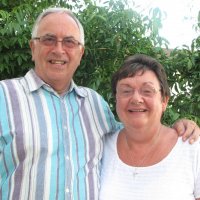 Geoff and Gina Poulter are active in healing ministry in Great Britain and in other European countries. They have zeal for building Lords kingdom. In Slovakia are already known mainly throwgh Jesus heals ministry where they were main speakers. They believe, that Lord comes with power, when we call him by His name and walk in faith. They are full of gentleness and kind behavior to people, which they serve with prayer for healing and prophetic giftings. Their ministry folows healings, sings and wonders.
Geoff and Gina Poulter are active in healing ministry in Great Britain and in other European countries. They have zeal for building Lords kingdom. In Slovakia are already known mainly throwgh Jesus heals ministry where they were main speakers. They believe, that Lord comes with power, when we call him by His name and walk in faith. They are full of gentleness and kind behavior to people, which they serve with prayer for healing and prophetic giftings. Their ministry folows healings, sings and wonders. - Petr Jašek
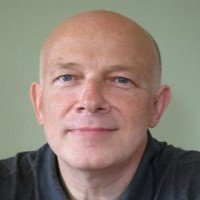 As we know, faith is not a question of heritage. People must get their personal relation with the Lord Jesus Christ. This cannot be inherited. You have to be reborn in Jesus. In my life something similar happened.
As we know, faith is not a question of heritage. People must get their personal relation with the Lord Jesus Christ. This cannot be inherited. You have to be reborn in Jesus. In my life something similar happened. - Ján Volko
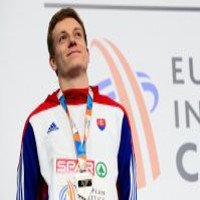 I think Jesus plays a very important role. Faith in God helps me in difficult moments and also during competitions. I feel that God gives me His graces and blessing – and this is a huge support for me.
I think Jesus plays a very important role. Faith in God helps me in difficult moments and also during competitions. I feel that God gives me His graces and blessing – and this is a huge support for me.

